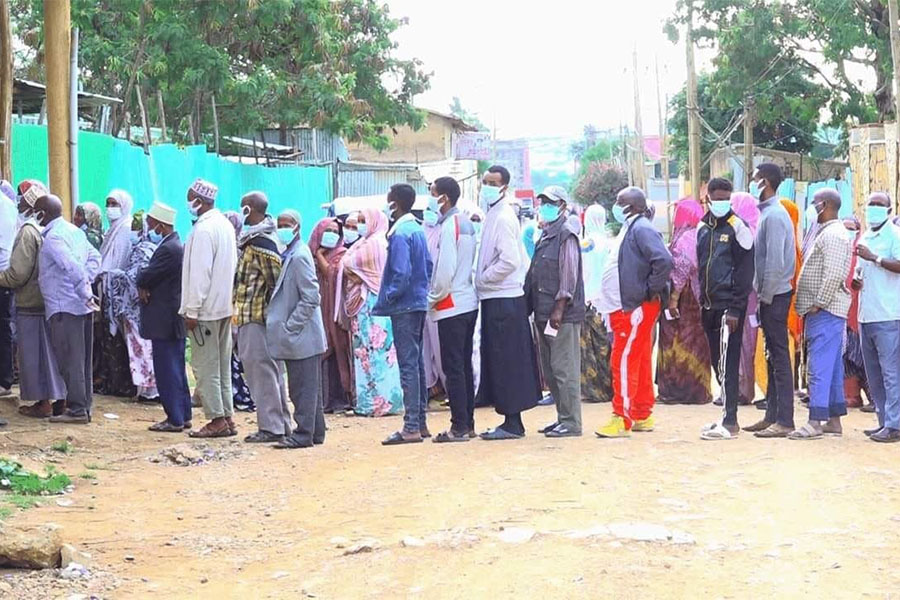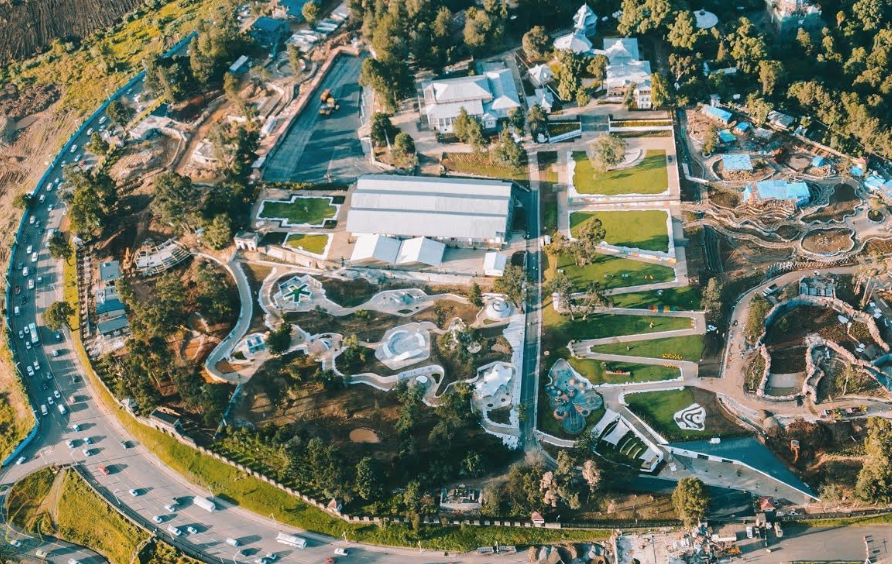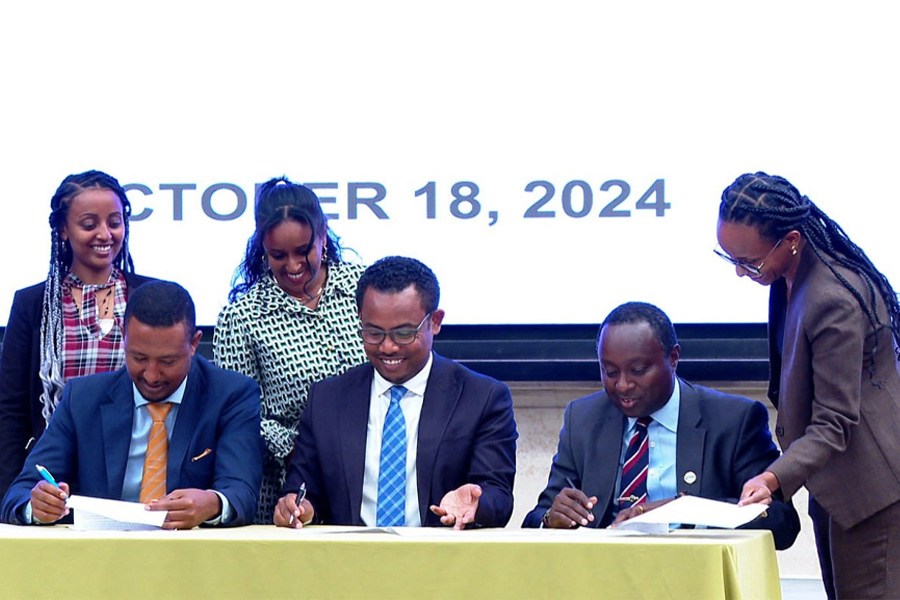
Commentaries | Jun 12,2021
Jul 13 , 2020
By MEHRET OKUBAY ( FORTUNE STAFF WRITER )
The newly legislated regional election law of Tigray Regional State has stipulated that the highest body of appeal for regional elections is the regional cassation bench. Early last week the regional council passed a law for the conducting of regional elections and the formation of a regional election management body.
The decision was passed unanimously by the 130 members who attended the council's meeting. The legislation is meant to govern elections for the state council, local elections, by-elections, re-elections and referendums.
The law was legislated despite the National Election Board of Ethiopia's (NEBE) letter issued on June 24 rejecting a request by the state council to administer elections in the Regional State. In its letter the Board highlighted that the move to hold elections in the region without the involvement of the Board would be unconstitutional.
The sixth national election is postponed after the Board stated that it would not be able to undertake elections during the Novel Coronavirus (COVID-19) pandemic.
The newly legislated election law establishing a regional election body has five staffers: an election commissioner and a deputy commissioner along with one secretariat and two more members. Nominations for the positions will be made by the public, civil society and political parties. Nominees will be vetted by a committee established by the legislation composed of members of the religious council, civil societies, labour unions and regional chambers.
The commissioner, who has a six-year term with the possibility of a one term extension, should speak the language of the regional government and must accept the right to self determination.
The election commission will be tasked with the responsibility of establishing election districts, voter and candidate registration and ensuring civic education is provided throughout the region.
People over the age of 18 who have lived in the Regional State for at least a year or were born there are eligible to vote. Candidates are required to be 21 years old or over and speak the language of their election district or the language of the Regional State.
The law maintains the 38 election districts in the Regional State and has increased the number of seats at the regional council to 160 with a special four and three seats being reserved for Irob and Kunama, respectively.
Gossaye Ayele, a constitutional law lecturer at the Civil Service University, argues that the Constitution identifies election law as held within the mandate of the federal government. Therefore, it cannot be listed among the residual powers left to regional governments.
“If the regional constitution allows for the regional government to legislate an election law, then the regional constitution itself would be unconstitutional.”
Assimba Democratic Party, one of the opposition parties in the Regional State, believes that the process is invalid.
"The election law should've been drafted and presented for discussion by the election commission,” said Dori Asgedom, chairperson of Assimba, adding that he felt one political party had drafted the rules of the game for themselves.
The Regional State's council had held a discussion among four political parties in the region on June 30, 2020 to discuss the election laws. Tigray People's Libration Front (TPLF), National Congress of Great Tigray (Baytona), Salsay Woyane Tigray (SaWOT) and Tigray Independent Party (TIP) were in attendance. The second oldest political party in the region, Arena, was not invited.
“We'd initially released a statement clarifying that we're interested in participating in elections, but we weren't invited,” said Dori. “TPLF invited the parties it favored not the political parties operating in the region."
Political parties that had clearly stated their interest to participate in the election were invited to the forum, according to Mulugeta Tareqeye, public relations head for the Council of Tigray, which approved an 18-billion-Br budget for the newly started fiscal year.
The regional election law maintains that political parties establish their legal personality through the NEBE and will only register for elections with the regional election commission, a decision the head of Salsay Woyane Tigray, Hayalu Godifay, does not agree with.
"The regional election commission is not mandated with the duty of establishing political parties in the regional government," he said, "so if NEBE was to deny us our identity as a political party for participating in the upcoming regional elections, the regional commission wouldn’t have the mandate to give us a legal personality; and this will put our position as an entity in question."
Hayalu also says that the regional legislation to establish the commission does not have a constitutional basis, it has only been established like any regional body with no clear autonomy of its own like the national election board that was established as any other democratic institution.
While its good for democratic institutions to have constitutional support, this alone does not regard the functional autonomy and effectiveness of a democratic institution, according to Gossaye.
During the drafting process, opposition parties raised concerns about the time and budget allocation for campaigning, which they claimed to be generous for the ruling party. The state council then removed these articles, leaving it to be determined by directives. There will be over 15 directives to be issued by the commission.
The final appeal about the regional election should also be the state supreme court, according to the new law.
“The Constitution clearly states that the federal cassation bench has the jurisdiction to oversee inconsistency in federal as well as regional state laws," said Gossaye. "Arguments that have been presented to state otherwise have simply been theoretical."
Political parties can source funds from regional and federal governments as well as bodies as prescribed by directives to be issued by the commission. The election will have local, international, community and political party observers. International observers will be invited by the electoral commission, while community observers will be picked by local residents.
“Many of our suggestions have not been incorporated into the final law,” said Hayalu. “We won't participate in elections to give legitimacy to a dictatorial regime."
PUBLISHED ON
Jul 13,2020 [ VOL
21 , NO
1055]

Commentaries | Jun 12,2021

Editorial | May 11,2019

My Opinion | Oct 05,2024

Fortune News | Sep 30,2021

Radar | Jun 27,2020

Fortune News | Oct 10,2019

Radar | Aug 16,2020

Fortune News | Dec 24,2022

Radar | May 25,2019

Radar | Oct 19,2024

Dec 22 , 2024 . By TIZITA SHEWAFERAW
Charged with transforming colossal state-owned enterprises into modern and competitiv...

Aug 18 , 2024 . By AKSAH ITALO
Although predictable Yonas Zerihun's job in the ride-hailing service is not immune to...

Jul 28 , 2024 . By TIZITA SHEWAFERAW
Unhabitual, perhaps too many, Samuel Gebreyohannes, 38, used to occasionally enjoy a couple of beers at breakfast. However, he recently swit...

Jul 13 , 2024 . By AKSAH ITALO
Investors who rely on tractors, trucks, and field vehicles for commuting, transporting commodities, and f...

Oct 4 , 2025
Eyob Tekalegn (PhD) had been in the Governor's chair for only weeks when, on Septembe...

Sep 27 , 2025
Four years into an experiment with “shock therapy” in education, the national moo...

Sep 20 , 2025
Getachew Reda's return to the national stage was always going to stir attention. Once...

Sep 13 , 2025
At its launch in Nairobi two years ago, the Africa Climate Summit was billed as the f...